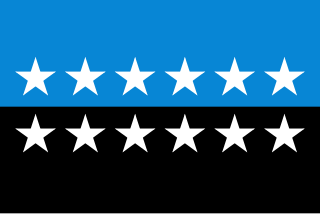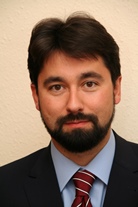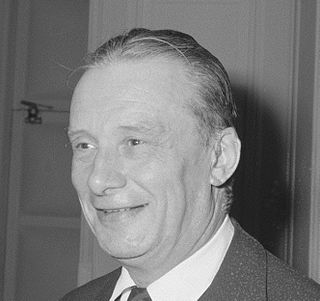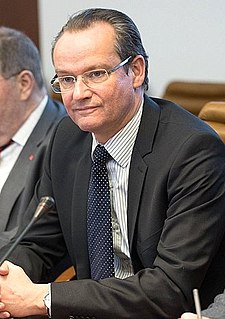Related Research Articles

The European Coal and Steel Community (ECSC) was an organisation of six European countries created after World War II to regulate their industrial production under a centralised authority. It was formally established in 1951 by the Treaty of Paris, signed by Belgium, France, Italy, Luxembourg, the Netherlands, and West Germany. The ECSC was the first international organisation to be based on the principles of supranationalism, and started the process of formal integration which ultimately led to the European Union.

The European Parliament (EP) is one of three legislative branches of the European Union and one of its seven institutions. Together with the Council of the European Union, it adopts European legislation, commonly on the proposal of the European Commission. The Parliament is composed of 705 members (MEPs). It represents the second-largest democratic electorate in the world and the largest trans-national democratic electorate in the world.

The European People's Party group is a centre-right political group of the European Parliament consisting of deputies (MEPs) from the member parties of the European People's Party (EPP). It sometimes includes independent MEPs and/or deputies from unaffiliated national parties. The EPP Group comprises politicians of Christian-democratic, conservative and liberal-conservative orientation.

The European Union is a geo-political entity covering a large portion of the European continent. It is founded upon numerous treaties and has undergone expansions and secessions that have taken it from 6 member states to 27, a majority of the states in Europe.

Jean-Baptiste Nicolas Robert Schuman was a Luxembourg-born French statesman. Schuman was a Christian Democrat political thinker and activist. Twice Prime Minister of France, a reformist Minister of Finance and a Foreign Minister, he was instrumental in building postwar European and trans-Atlantic institutions and was one of the founders of the European Union, the Council of Europe and NATO. The 1964–1965 academic year at the College of Europe was named in his honour.

Europe Day is a day celebrating "peace and unity in Europe" celebrated on 5 May by the Council of Europe and on 9 May by the European Union.

Sandra Kalniete is a Latvian politician, author, diplomat and independence movement leader. She served as Foreign Minister of Latvia 2002–2004 and as European Commissioner for Agriculture, Rural Development and Fisheries in 2004. Since 2009, she has served as Member of the European Parliament (MEP) for the European People's Party.

The European People's Party (EPP) is a European political party with Christian-democratic, conservative and liberal-conservative member parties. A transnational organisation, it is composed of other political parties, not individuals. Founded by primarily Christian-democratic parties in 1976, it has since broadened its membership to include liberal-conservative parties and parties with other centre-right political perspectives. On 20 November 2019 the party elected as its President the former Prime Minister of Poland and President of the European Council, Donald Tusk.
A supranational union is a type of multinational political union where negotiated power is delegated to an authority by governments of member states.

Hans-Gert Pöttering is a German conservative politician, and served as President of the European Parliament from January 2007 to July 2009 and as Chairman of the CDU-affiliated Konrad Adenauer Foundation from 2010 to 2017.

Michael Gahler is a German politician and Member of the European Parliament (MEP) from Germany. He is a member of the Christian Democratic Union, part of the European People's Party.

Nicholas William Bethell, 4th Baron Bethell was a British politician. He was a historian of Central and Eastern Europe. He was also a translator and human rights activist. He sat in the House of Lords as a Conservative from 1967 to 1999. He served as an appointed member of the European Assembly from 1975 to 1979, and as an elected Member of the European Parliament from 1979 to 1994, and from 1999 to 2003.

John Joseph McCartin is a former Irish Fine Gael politician who served as a Member of the European Parliament (MEP) for the Connacht–Ulster constituency from 1979 to 2004. He served as a Teachta Dála (TD) for the Sligo–Leitrim constituency from 1981 to 1982 and 1982 to 1987. He also served as a Senator for the Agricultural Panel from 1973 to 1981.

Fabienne Keller is a French politician who has been serving as a Member of the European Parliament since 2019. She previously was the mayor (UDF) of Strasbourg, France, from March 2001 to March 2008.

Róża Maria Thun, is a Polish politician, more usually known as Róża Thun, than by her formal style of Countess.
The Robert Schuman Foundation is a Christian Democratic think tank affiliated with the European People's Party group in the European Parliament, and named in honour of statesman Robert Schuman. Its President is Jacques Santer. It is affiliated to the Centre for European Studies, the official foundation/think tank of the European People's Party.

Balázs Hidvéghi is a Hungarian politician, former Member of Parliament, and also the Deputy Director for Strategy of Fidesz-Hungarian Civic Union responsible for Hungarian communities in the Carpathian Basin and the Hungarian diaspora.

Pierre Wigny was a Belgian politician of the Christian Social Party.

Gunther Krichbaum is a German lawyer and politician of the Christian Democratic Union of Germany (CDU). He holds the chair of the Committee on European Union Affairs of the German Bundestag since 2007.

A referendum on the Brexit withdrawal agreement, also referred to as a "second referendum" a "people's vote", or a "confirmatory public vote", was proposed by a number of politicians and pressure groups as a way to break the deadlock during the 2017–19 Parliament surrounding the meaningful vote on the Brexit deal.
References
- "The Robert Schuman Medal". European People's Party Group in the European Parliament . Retrieved 16 April 2019.
Notes
- ↑ "The Robert Schuman Medal". European People's Party Group in the European Parliament . Retrieved 16 April 2019.
| This award-related article is a stub. You can help Wikipedia by expanding it. |